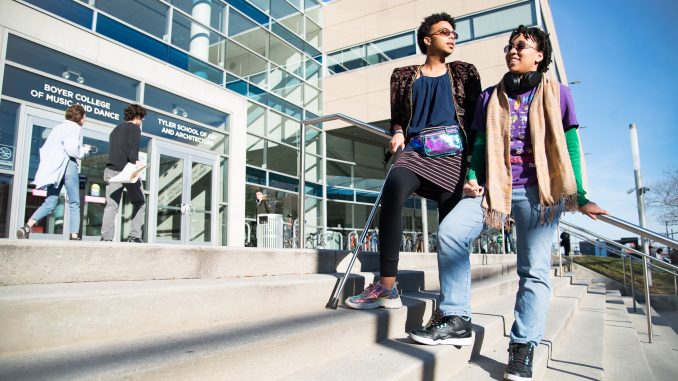
To Osimiri Sprowal, transgender people are “walking art.”
Sprowal is the founder and executive director of deadname.arts, an art collective for transgender and nonbinary individuals. It is “the only non-cis artist collective” in Philadelphia, according to deadname.arts’ Instagram page.
“We are art, period, because art is to create something that did not exist,” said Sprowal, a senior Africology major. “My entire life is creating myself as someone who did not exist yesterday and might not exist tomorrow depending on how I feel or what’s going on in my body.”
The collective was founded in 2019, and focuses on giving gender non-conforming artists a space to express themselves through art showcases, visual displays, poetry and events “catered to people who aren’t cis,” Sprowal said.
“I think that deadname is a vital space for trans artists because in a lot of cisgender spaces, I find that trans artistry is not seen, it is not advocated for and it is not affirmed and protected in the ways that it should be,” said Ronnie Nocella, a senior political science major and the collective’s executive producer. “As an all-trans and gender variant organization … we want to create the space to give trans artists the compensation and the reward that they deserve.”
According to a 2015 report by the National Center for Transgender Equality, 48 percent of transgender individuals have reported “being denied equal treatment, verbally harassed, and/or physically attacked in the past year because of being transgender.”
“I experience violence 24/7,” Sprowal said. “Everyone in my collective experiences violence 24/7. The point of making a house is so you get to say who’s in it and who’s not. So if I say there’s no cis people in my house, there’s no cis people in my house.”
During the fall semester, deadname.arts participated in a poetry reading fundraiser for the Philadelphia Indigenous community. The collective will hold an open call in the coming weeks for transgender and nonbinary visual artists, dancers and musicians to audition to join the collective, Sprowal said.
The LGBTQ community has not always been able to openly celebrate their identities, said Brad Windhauser, an associate professor for the gender, sexuality and women’s studies program.
Historically, LGBTQ individuals have had to “carve out spaces that mainstream society has not made available to [them],” Windhauser added.
In the past, these spaces were often exclusively “geared toward adults,” like gay bars and clubs, Windhauser said. But in the 1980s and 1990s, at the height of the AIDS crisis, the LGBTQ community began to emphasize community-building and activism, and different types of LGBTQ spaces were more common, reported Urban Omnibus, the Architectural League of New York’s online publication.
“Because [the LGBTQ community has] also had struggles being accepted in family units, communities, whatever, we’ve had to form our own communities that have nurtured us,” Windhauser said. “Having spaces that are dedicated to us, particularly youth, has been hyper-important. …Having artistic spaces enables them to not just process their experiences, but share those experiences in ways that other communities have always had the privilege of doing.”
Transgender and nonbinary first-year college students rate themselves lower than the national average in social self-confidence, but higher than the national average in confidence in their creativity and artistic ability, according to a 2018 report by the UCLA Law Williams Institute on Sexual Orientation and Gender Identity Law and Public Policy.
Deadname.arts exists to give transgender and nonbinary individuals a way to define their own legacy, Nocella said.
“I think that the most powerful thing that a gender-expansive person has is their name and autonomy over how their name is known for the rest of time,” Nocella added. “That is why our organization is so vital because we make sure that people’s names are known as we want them to be known for the rest of time.”


Be the first to comment